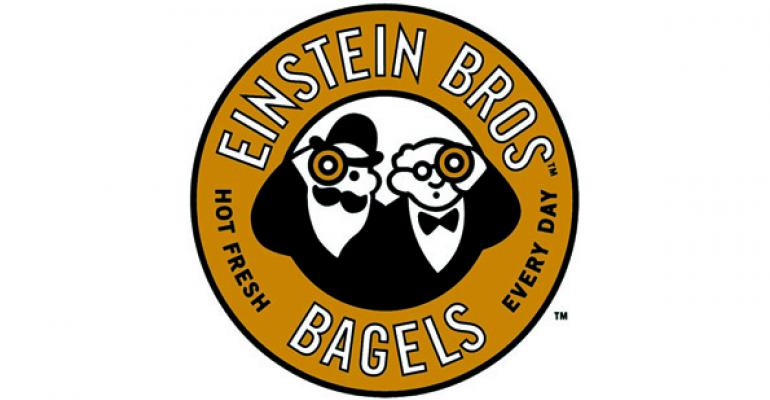Einstein Noah Restaurant Group Inc. will be acquired by JAB Holding Co., an affiliate of the private-equity firm Joh. A. Benckiser Group, in a move that would take the bagel operator private, JAB said Monday.
Einstein Noah is parent to the Einstein Bros. Bagels, Noah’s New York Bagels and Manhattan Bagel brands, which operate, franchise and license more than 855 restaurants in 42 states and the District of Columbia, along with a dough-production facility.
Under the agreement, JAB would acquire Einstein Noah’s outstanding shares for $20.25 per share, which represents a premium of about 47 percent over the company’s average trading price, or a total equity value of about $374 million.
Nelson Heumann, chairman of Einstein Noah’s board, said in a statement that the deal will “not only realize significant immediate value for our stockholders, but will continue to revitalize our brand, enhance our nationwide footprint and solidify our position as the leader in the fresh-baked bagels industry.”
Olivier Goudet, partner and chief executive of JAB, said Einstein Noah “has a great collection of brands that reflect JAB’s long-term investment philosophy, and we see significant opportunity for growth.”
In 2012, Joh. A. Benckiser, based in Ludwigshafen, Germany, acquired Berkeley, Calif.-based Peet’s Coffee & Tea in a $1 billion deal that took the chain private. A few months later, JAB acquired Caribou Coffee in a $340 million deal that also took the chain private.
Joh. A. Benckiser also holds a stake in D.E. Master Blenders 1753 N.V., a coffee and tea brand based in Amsterdam, as well as the leather goods company Labelux, which manages brands like Jimmy Choo, Bally and Belstaff.
As part of the Einstein deal, the chain would maintain its Lakewood, Colo., headquarters and would operate as a standalone business in the JAB portfolio, the company said. Michael Tattersfield, Caribou Coffee’s chief executive, would serve as chairman of the board.
“I am looking forward to working with the Einstein Noah Restaurant Group’s talented executive team,” Tattersfield said in a statement. “Having worked in and around the food industry for many years, I have long admired the Einstein Noah Restaurant Group’s strong market position and growth potential, and I am looking forward to contributing to the company’s continued success.”
As with the Caribou deal, BDT Capital Partners, a Chicago-based merchant bank, is a minority investor in the deal, along with JAB. BDT & Company LLC served as financial co-advisor to JAB with Citigroup Global Markets Inc.
Skadden, Arps, Slate, Meagher & Flom LLP acted as legal advisor to JAB. Stifel is serving as financial advisor to Einstein Noah, and Alston & Bird LLP is acting as the bagel operator’s legal advisor.
The JAB transaction has the support of Greenlight Capital, an investment group led by David Einhorn, Einstein Noah’s largest shareholder, who holds a more than 35-percent stake in the company.
Greelight has agreed to tender its shares and JAB will acquire all remaining shares not tendered in the offer through a second-step merger at the same price as the tender offer.
Einhorn said in a statement: “For more than a decade, we have worked closely with the Einstein Noah Restaurant Group to execute a turnaround plan, reducing debt and expanding its store footprint. JAB is an experienced firm that will lead Einstein Noah Restaurant Group to its next phase of growth.”
Building a turnaround
(Continued from page 1)
For several years, Einstein Noah has been working on a turnaround plan to reignite growth. Efforts have included the rollout of a new premium coffee program, the launch of a healthful Smart Choices menu platform, and a focus on growing catering sales and moving into more nontraditional locations.
For its July 1-ended second quarter, Einstein Noah reported a 24-percent decline in net income, largely attributed to expenses related to management transitions and reorganization.
However, brand revitalization efforts were taking hold, the company said. Revenue rose 4 percent during the quarter, to $112.4 million, and systemwide same-store sales increased 1.6 percent.
In February, former chief executive Jeff O’Neill resigned suddenly. In May, chief operating officer Emanuel “Manny” Hilario also resigned.
Earlier this month, however, the company named Frank Paci, the former president of McAlister’s Deli, to the position of president and chief executive.
In 2012, Einstein Noah said it was exploring strategic options including a possible sale. Later that year, however, the company recapitalized its debt and put sale rumors to rest.
In a report Monday, Nicole Miller Regan, senior research analyst for Piper Jaffray & Co., said the deal price represents about 8.8-times earnings before interest, taxes, depreciation and amortization, or EBITDA.
That’s higher than typical transactions of late, in part because Einstein Noah offers opportunity around its high-margin franchised/licensed growth strategy and future unit growth potential, she said.
The deal also supports her ongoing theory that the restaurant space has scarce supply of investable growth companies, she wrote, which is supporting “premium multiples where deserved.”
Regan wrote that the industry has entered a phase where “10-percent-ish is considered the threshold for high growth, a starkly different profile from that of a decade ago, where many companies were growing at twice that pace. During the past 10 years, the overall public company investable base has declined about 44 percent, supporting our claim that an overall scarcity of investable restaurant shares, and thus growth companies, exists.”
Contact Lisa Jennings at [email protected].
Follow her on Twitter: @livetodineout




